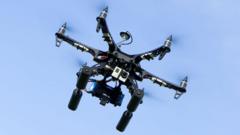In a strategic move to bolster national security, Germany’s government has given the military the authority to shoot down drones that pose a threat to military installations and critical infrastructure. This follows a notable increase in reports of unidentified drones flying over sensitive areas, particularly after the escalation of conflicts involving Russia since its invasion of Ukraine in February 2022.
Interior Minister Nancy Faeser emphasized the growing concerns surrounding drone surveillance, stating that "especially since [Russian President Vladimir] Putin's war of aggression against Ukraine, we have seen that drones are being used more and more frequently, which poses an increasing challenge for the police and their current technology." Faeser stressed the need for effective measures to mitigate potential threats, addressing concerns about espionage and sabotage.
The decision comes amid intensified scrutiny of Russian activities, with Poland's Prime Minister Donald Tusk asserting that there have been plans for "acts of air terror" coordinated by Russian operatives targeting various countries, including Poland and against international airlines globally. Although Moscow denies these allegations, NATO's recent undertakings to enhance maritime surveillance in the Baltic Sea indicate ongoing apprehension about sabotage attempts, especially concerning critical undersea cables damaged last year.
In recent weeks, multiple drone sightings have been recorded, including sightings over the Manching Air Base and the US Ramstein Air Base. The new legislation, pending parliamentary approval, would empower the German Army to take decisive action against drones if they reportedly jeopardize public safety or critical facilities, shifting from merely enforcing no-fly zones to potentially engaging hostile drones directly.
Notably, international experts link the drone activities to a broader Russian strategy of hybrid warfare aimed at destabilizing Western support for Ukraine. The situation reflects a complex nexus of military readiness, security policy, and international relations as nations react to perceived threats amidst ongoing conflicts in Eastern Europe.
With these concerns fresh in the public discourse, Germany’s decision is likely to resonate across Europe, where nations remain vigilant about potential security risks stemming from drone technology and foreign interventions in national affairs.
Interior Minister Nancy Faeser emphasized the growing concerns surrounding drone surveillance, stating that "especially since [Russian President Vladimir] Putin's war of aggression against Ukraine, we have seen that drones are being used more and more frequently, which poses an increasing challenge for the police and their current technology." Faeser stressed the need for effective measures to mitigate potential threats, addressing concerns about espionage and sabotage.
The decision comes amid intensified scrutiny of Russian activities, with Poland's Prime Minister Donald Tusk asserting that there have been plans for "acts of air terror" coordinated by Russian operatives targeting various countries, including Poland and against international airlines globally. Although Moscow denies these allegations, NATO's recent undertakings to enhance maritime surveillance in the Baltic Sea indicate ongoing apprehension about sabotage attempts, especially concerning critical undersea cables damaged last year.
In recent weeks, multiple drone sightings have been recorded, including sightings over the Manching Air Base and the US Ramstein Air Base. The new legislation, pending parliamentary approval, would empower the German Army to take decisive action against drones if they reportedly jeopardize public safety or critical facilities, shifting from merely enforcing no-fly zones to potentially engaging hostile drones directly.
Notably, international experts link the drone activities to a broader Russian strategy of hybrid warfare aimed at destabilizing Western support for Ukraine. The situation reflects a complex nexus of military readiness, security policy, and international relations as nations react to perceived threats amidst ongoing conflicts in Eastern Europe.
With these concerns fresh in the public discourse, Germany’s decision is likely to resonate across Europe, where nations remain vigilant about potential security risks stemming from drone technology and foreign interventions in national affairs.





















